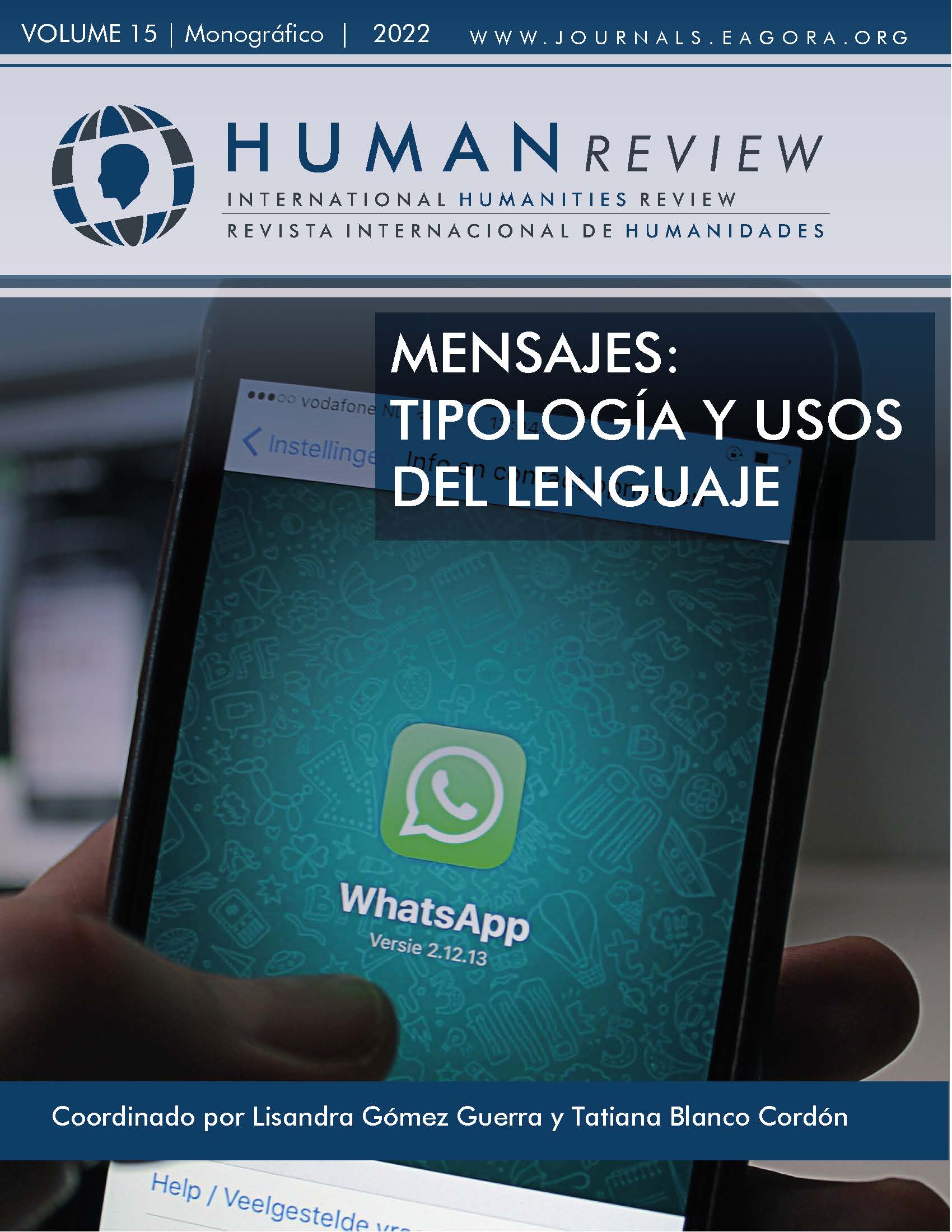Words from the shadows
Emotion and resistance in Concha Espina’s letters to her North American translator Terrell Tatum
DOI:
https://doi.org/10.37467/revhuman.v11.4202Keywords:
Emotion, Ideology, Literature, Letters, AmericaAbstract
In this work we approach the emotional life of the writer Concha Espina through her private correspondence with the North American Hispanist Terrell Tatum. We wanted to contrast the sentiments written by the author in these letters with her own works and with the bibliography that has dealt with her personal and public life. Therefore, our objective has been to treat his figure in complete terms, but delving into her emotions, those of the heart and the intellectual, social and political ones.
References
Candau Chacón, M. L. (2019). Pasiones en femenino Europa y América, 1600-1950. Editorial Universidad de Sevilla
Cano, J. (1939) La Mujer en la Novela de Concha Espina. Hispania, 22(1), 51-60.
Congreso de los Diputados. (2021). La diputada Campoamor y los derechos civiles y políticos de las mujeres. Gobierno de España. https://www.congreso.es/cem/vidparl1931-5
De la Maza, J. (1957) Vida de mi madre, Concha Espina. Editorial Magisterio Español.
Espina, C. (1932). Singladuras. Viaje americano. Compañía Iberoamericana de Publicaciones.
Fernández Gallo, C. (2010). Concha Espina: narrativa extensa de una novelista que quiso ser poeta. Librería Estvdio.
Diego, G. (1962). Concha Espina. Selección y Estudio. Editorial LA MODERNA,
Kirkpatrick, J. A. (1996). Concha Espina: giros ideológicos y la novela de mujer. Hispanic Journal 17(1), 129-139.
La Prensa. (1 de agosto de 1929). En la escuela española de Middlebury College. La Prensa. http://www.memoriademadrid.es/buscador.php?accion=VerFicha&id=132279&num_id=1&num_total=3
Lavergné, G. (1986). Vida y obra de concha espina. Fundación Universitaria Española.
Márquez Macías, R. (2022). El hogar americano en Madrid. Una institución de corta vida con trayectoria internacional. Temas Americanistas, 48, 143–166.
Narbona, C. (2010) Prólogo a Singladuras: viaje americano, de Concha Espina. Editorial Evohé .
Pérez de Armiñán, A. (6 de julio de 2021). Concha Espina. V Ciclo “Españolas por descubrir”, Instituto Cervantes, Madrid.
Real Academia de la Historia. (s.f.). Concepción Espina y Tagle. Ministerio de Ciencia e Innovación. https://dbe.rah.es/biografias/8945/concepcion-espina-y-tagle
Tatum, T. (1933). Reseña a Singladuras de Concha Espina. Books Abroad, 7(1), 36.
Tatum, T. (1935). Reseña a Entre la noche y el mar de Concha Espina. Books Abroad, 9(1), 84.
Tatum, T. (1940). General Survey of the Study of Spanish. Hispania, 23(4), 384-390.
Tatum, T. (1942) Onda Corta-a Radio Journey to Latin America. Houghton Mifflin Company,
Tatum, T. (1945). Pan American Business Spanish. Appleton-Century Co.
Tatum, T. (1947). Viñetas de la América Latina. Nueva York: holt.
Tatum, T. (1948a). Reseña a Lecturas hispánicas de Concha Espina. The Modern Language Journal, 32(4), 319.
Tatum, T. (1948b). The Teaching of Commercial Spanish -- A Challenge and an Opportunity. Hispania, 31(1), 43-48.
Tatum, T. (1953). Reseña a Sueño de una noche de agosto de Gregorio Martínez Sierra y Donald Devenich Walsh. The Modern Language Journal, 37(3), 163.
Tatum, T. (1958a). Cartas, 1958-1959, a Juan Antonio de Zunzunegui. Chattanooga.
Tatum, T. (1958b). Reseña a Vida de mi madre de Concha Espina. Books Abroad, 32(2), 180-181.
Tatum, T. (1959). Four Prize-Winning Women Novelists of Spain. Books Abroad, 33(1), 10-14.
Tatum, T. (1960). Cuentos recientes de España. Charles Scribner‘s Sons.
Tatum, T. (29 de Julio de 1934). A Spanish Novel. The woman and the sea. The New York Times. https://timesmachine.nytimes.com/timesmachine/1934/07/29/95052394.html?pageNumber=37
Ugarte, M. (1997). The Fascist narrative of Concha Espina. Arizona Journal Of Hispanic Cultural Studies, 1, 97-114.
Zaragoza-Bernal, J. M. (2013). Historia de las emociones una corriente historiográfica en expansión, Asclepio: Revista de historia de la medicina y de la ciencia, 65(1), 10.
Downloads
Published
How to Cite
Issue
Section
License
Those authors who publish in this journal accept the following terms:
- Authors will keep the moral right of the work and they will transfer the commercial rights.
- After 1 year from publication, the work shall thereafter be open access online on our website, but will retain copyright.
- In the event that the authors wish to assign an Creative Commons (CC) license, they may request it by writing to publishing@eagora.org









